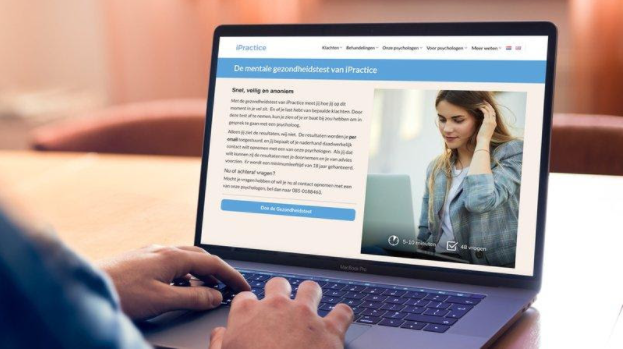With the Pointerpro tool, companies can easily create assessments, but above all: automatically link personalized advice to the respondent in question. And although this tool is currently being used by consultants, coaches, HR professionals and marketers in over 50 countries, it actually started very small and even on a family-basis: the founder and CEO created it for… his daughter’s birthday party!
Engineer Stefan Debois worked as a consultant for large companies such as IBM and CSC, but dreamed of developing his own software instead of working with existing enterprise software. He explored different technologies, but the ball really started rolling when he created a quiz for his daughter’s birthday.
“I then set up a website around that quiz, so that other people could create their own quizzes on their tablets,” he explains. “It was a hobby project, intended for individuals, but it also got a lot of traction from companies, who used it in their HR departments or for a quiz at a company event. At a certain point I decided to make surveys available as well as quizzes, so I could serve a broader market. And that is how Pointerpro was born. The common thread was that these surveys could and should contain an element of fun.
I wanted to get rid of the idea that questionnaires and surveys are boring, by giving the participant something valuable in return – for example, a photo or a fun anecdote. That fun aspect then gradually evolved into what Pointerpro is today: assessments to which useful and personalized advice for the respondent is linked, based on what they entered in the survey. Hence our baseline: ‘Ask. Assess. Advise’ – with the fourth ‘A’ being ‘automate,’ but that might have been pushing it a bit (laughs).”

Democratizing medical advice
“Let me give you the example of a financial assessment,” the CEO says. “You might be asked whether you want to take a lot or a little risk with your investments. If the answer is ‘a lot,’ the advice is ‘invest in stocks’; if it is ‘little,’ then the advice is ‘bonds.’
Now that’s a very simple illustration, but it does indicate what we want to do. And so it can be much more complex advice, but always with the advantage that the customer doesn’t need to have the technical expertise to set up the logic that generates the advice. They don’t have to be able to program, but can very easily set it up themselves- the software under the hood may be quite complex, but the driver himself can steer it very easily. But of course, we can also do that at the customer’s request, if they prefer to outsource it.”
If you want to give good advice, you have to start by asking the right questions.
“Simply put, our tool allows companies to start automating and digitizing part of their professional consulting business. This mainly involves mid-size consulting and professional services companies, but we also work at the corporate level. For example, one of the largest pharmaceutical companies in the world uses our platform to automate part of its medical consultancy. For instance, they send an assessment to asthma patients, who receive advice via a PDF report based on the input of their symptoms. They can then send this on or take it to their own doctor.
This is highly accessible, which can play an important role when it comes to sensitive subjects like mental wellbeing and mental health care. This is something we’ve already worked on: iPractice.nl uses our software for their mental health test. Democratizing medical advice: we think this is a great mission, and we are proud that we can make it happen.
But such an assessment is also used by marketers to on-board prospects, or by security companies to carry out a check. So that’s possible too. In other words, a lot is possible. Even internationally, although we arrange everything from Belgium. So in the morning, we can be on the phone with one side of the world, and in the evening with the other.”
The quest for the Holy Grail
To be clear: Pointerpro doesn’t do that consulting or advisory work itself, but offers companies the tool or software platform, on which they can then drop their expertise, after which it is automatically and, if desired, widely molded into useful and logical advice for those respondents.
“At the moment we are also looking at how we can use A.I. in the long term, so that clients can also generate their assessments automatically, based on existing content such as white papers or e-books. But then we are really talking about the Holy Grail (laughs). That really isn’t obvious, because if you want to give good advice, you have to start by asking the right questions.”
In any case, digitization brings an efficiency advantage.
Stefan Debois notes in any case that companies are increasingly using assessments to collect data at the same time as giving targeted advice to their target group. “In any case, digitization brings an efficiency advantage,” he says. “If you can lower the threshold to provide specialized, tailor-made advice, you also democratize your know-how. This allows you, as an organization, to appeal to a much larger audience, which also creates a competitive advantage.

Not written by a consultant
“The condition in all of this, of course, is that the advice comes across as human as possible. What do I mean by that? Just because it’s digital advice doesn’t mean it has to be impersonal. The best compliment we received in that respect came from a respondent who thought that the report he had received via the tool had been written by a consultant.”
At the moment we are also looking at how we can use A.I. in the long term.
“The suggestion given to the respondent should be as compact, relevant, and personal as possible, because they often have little time and are not interested in general recommendations. And why not throw in a joke now and then, or some inside information? So it comes across as more informal, and less like a dry survey. But what we mainly want is for the customer to subconsciously think ‘aha, that organization really gets me’.”
The original article was published on Bloovi.



